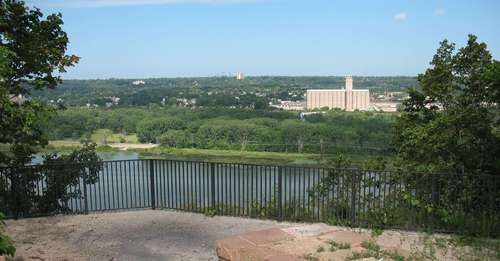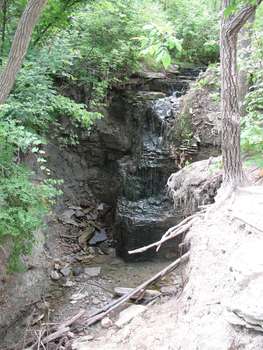Stage being set for $9.2 million makeover of St. Paul's Lilydale Park

The view from Vento's View at the top of the Brickyard Trail in Lilydale Park, overlooking Pickerel Lake and the rest of the Park below.
Photo: Whitney Clark/FMR
Plan envisions new water filtration, a picnic site, reconfigured interpretive trails, and an off-leash dog park
July 20, 2009
by Bob Spaulding
Once the site of a small floodplain village, St. Pauls Lilydale Park is taking a significant step toward clean-up and rebirth as a premier regional natural space. Local leaders hope to finish the work started decades ago: transforming Lilydale Park from a flood-prone village to a natural oasis, right in the shadow of downtown St. Paul.
On July 15th, the St. Paul Parks and Recreation Commission approved a Master Plan concept for the park. When it is finally approved by the St. Paul City Council later this year, the Master Plan will open the door to an anticipated $9.2 million slate of investment in restoration and improvements to the park.
The improvements cap four decades of transition for the area, tracing back to floods in the 1960s that made the former heart of Lilydale uninhabitable. After waiting many years for City attention, this May St. Paul released a Natural Resources Management Plan to guide the park back to a more natural state.
Eyes were also opened to the potential of the park by the recent opening of the spectacular Brickyard Trail, which winds from Pickerel Lake up the bluff to the Ventos View blufftop overlook. Friends of Lilydale Park, led by neighbors Jon Kerr and Grit Youngquist, led the creation of the interpretive trail. The group has also been an active leader in stewardship, recreation and education activities in the park.
After two years of stakeholder feedback and design, City Parks Landscape Architect Alice Messer presented a full vision for the park to a Design Advisory Task Force on July 1st. The Master Plan recommended by both the Design Advisory Task Force and Parks Commission includes:
- Enhancement of the water quality in Pickerel Lake. Pickerel Lake lies at the heart of the park, and though it enjoys better water quality than the Mississippi, it too is at risk. It is fed not by the Mississippi, but by Ivy Falls at its southwest corner. A new storm water treatment area at Pickerels southwest corner will protect Pickerels water quality from the chemicals in the substantial residential runoff.
- Removal of construction and other debris. In other quadrants of the park, trees sprout from mounds of construction debris, sidewalk chunks and rubble long ago left on the site. Open foundations remain from buildings long ago razed. The plan opens the door to seek funding to remove this debris and rubble, and re-establish a fully natural character in the area.
- Rerouting of trails. The regional biking and walking trail will be re-routed to more closely follow the river, and will have a new, separate path under the nearby railroad swing bridge. Additional smaller crushed-stone hiking trails will be added.
- A restored riverfront. Smaller areas of concrete will be removed from riverfront, and it will be restored to a naturalized condition. The new riverbank will protect from future erosion, and provide viewing areas for those who walk the new regional trail.
- New interpretive signage. Building on the interpretive signage on the Brickyard Trail up the bluff, improved signage will interpret the sites significant natural and cultural history.
- Rerouting of Lilydale Road. Lilydale Road, which is the principal artery through the park, will be pulled away from Pickerel Lake in the center of the park. This will make room for a new small picnic area and restroom facilities on-site. Lilydale Road will also be pulled slightly away from the river in the Parks eastern end to allow the regional trail and roadway to be fully separated.
- Creation of new picnic grounds. A new focus will be created at the heart of the Park, along the north shore of Pickerel Lake. In order to enhance access to the Park, two small picnic shelters with four to six tables, and a new restroom facility will be created. The area will also have a fishing dock, and canoe launch into Pickerel Lake.
- A new boardwalk and wildlife viewing platforms. A new boardwalk will connect the main picnic area on the north side of the lake to the base of the brickyard trail on the southeast side. Several new wildlife viewing platforms will connect visitors to natural amenities in key parts of the park.
- An Off-leash dog park. Though a relatively recent addition to the concept, the most talked-about part of the plan is a 8.5-acre fenced, off-leash dog park near the Mississippi and Lilydale Parks western edge. The dog park would be sited on one of the areas of the park most impacted by pollution and construction debris, and would be opened only after the area had been restored.

A small waterfall along the trail up the Brickyard Trail in Lilydale Park.
Photo: Whitney Clark/FMR
Youngquist explained that the idea of a dog park bubbled up late in the process, and she wanted to make sure that the community had an honest discussion about whether a dog park would be an appropriate use in that location. I was actually pretty surprised to have such an enthusiastic response to the proposal, she said at a recent meeting.
City staff presented a variety of survey data that showed a dog park in varied light among the general public. Those concerned with the dog park concept worried that it could damage the natural resources in the area would draw too many people to the park, and was needlessly close to the Mississippi River. On the other hand, many felt a dog park would help address a nagging concern over safety and isolation in that part of the park by bringing additional activity to the area.
FMR, along with others, felt a dog parks benefits would likely outweigh any drawbacks, and might even expand the base of volunteer stewards to care for the park. While acknowledging more refinement of the concept was needed, seven of the eleven Task Force members present supported the dog park concept advancing as part of a final plan.
A variety of federal, state, regional and local funding will be sought to move those improvements forward in coming years. And some funding is at the ready: the newly-formed St. Paul Parks Conservancy has committed to the park as its first priority for investment.
One of the beauties of the park is that it is a crossroads between the natural and historic environment, Kerr said last year. We think its possible and appropriate to arrive at a sustainable balance between those assets.
The master plan goes to the St. Paul City Council for final adoption later this year. St. Paul Parks expects to form a new Task Force to work through some of the more detailed design issues as funding and work progresses.
Links:
- FMR Letter of Comment on Lilydale Park Master Plan
- City of St. Paul: Lilydale Regional Park Master Planning Website
- Lilydale Regional Park Master Plan, as recommended by Task Force (PDF, 13.8 MB)
- Lilydale Regional Park Natural Resources Management Plan (PDF, 24 MB)
- Friends of Lilydale Park (Facebook)
- Friends of Lilydale Park (website)